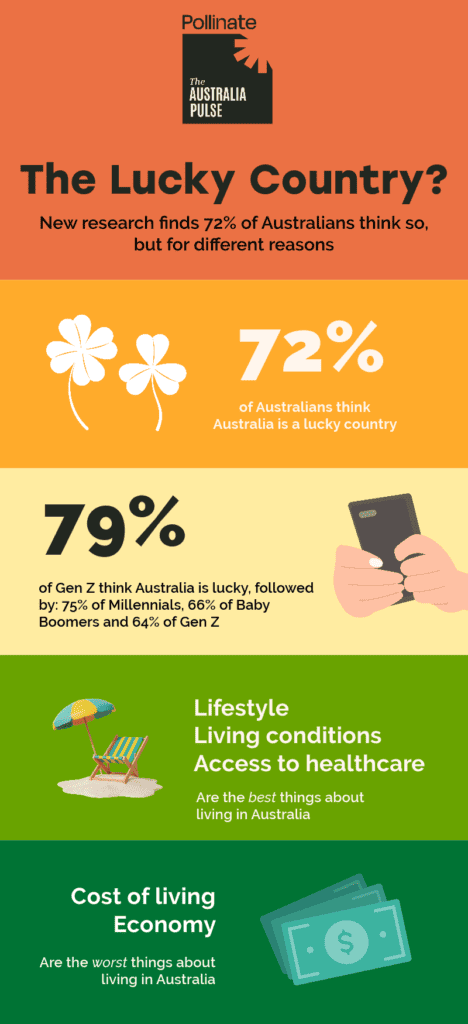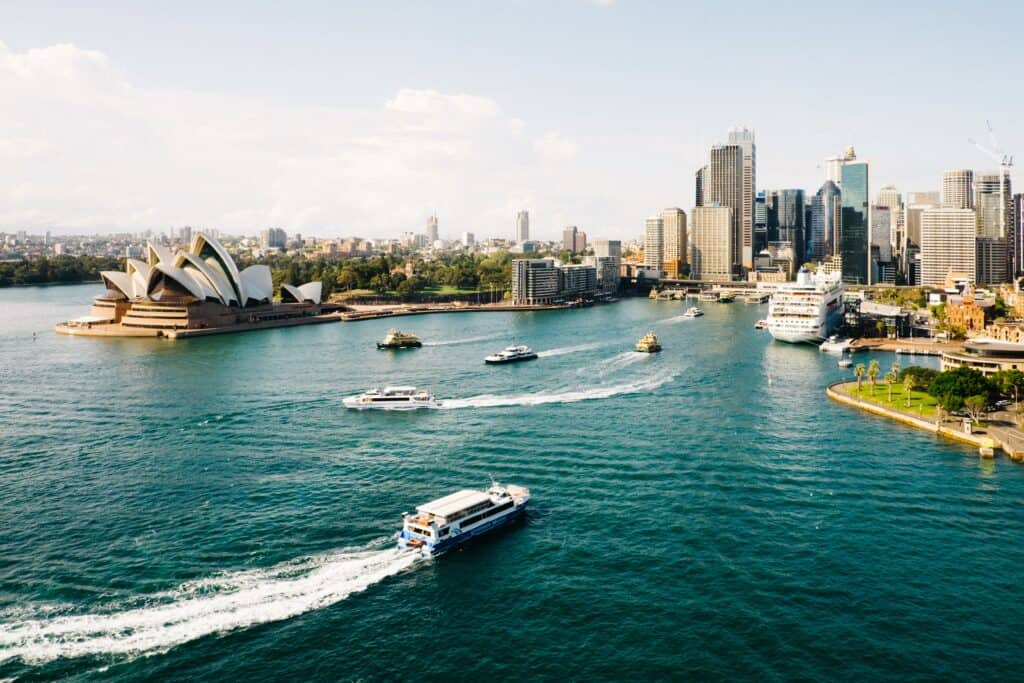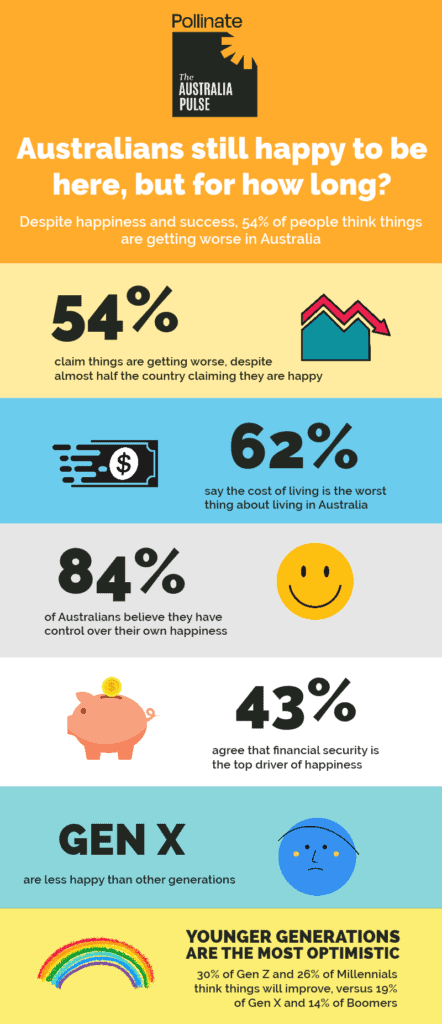The new The Australia Pulse study from strategic insights business Pollinate has revealed Australia still holds its standing as “the lucky country” among Australians, however, there is a strong belief that things will get worse.
According to the study, 72% agree that Australia is “the lucky country”, 15% unsure, and 13% say it isn’t. While most are lucky, people are divided on what that actually means.
The new study noted that Australians define a “lucky country” with opportunity, access to basic needs, healthcare, the ability to get a job, safety, inclusivity, freedom from war, freedom to express views, and natural resources as the top themes among respondents.
The bi-annual Pollinate survey, conducted in August this year, found that younger generations are more likely to have a positive outlook and agree that Australia is lucky, with 79% of Gen Z and 75% of Millennials agreeing versus 66% of Boomers and 64% of Gen X.
Overall, all respondents agree that the best things about living in Australia are lifestyle, living conditions and access to healthcare – and the worst thing is the cost of living.
For Boomers, Australia’s standing as a “lucky country” is underpinned by its lifestyle, living conditions, weather and climate, access to healthcare, natural landscape and the view that it is the land of opportunity. For Gen X, it’s lifestyle, natural landscape, living conditions, access to healthcare, weather and climate
For Millennials, it’s lifestyle, living conditions, access to healthcare, weather and climate. And for Gen Z, it’s access to healthcare, lifestyle, natural landscape, living conditions, weather and climate.

Parry-Husbands, Pollinate’s chief executive officer, said: “The phrase ‘the lucky country’ was coined by author Donald Horne in 1964 and has been used ever since to describe Australia as a land of economic opportunity and bountiful natural resources. As it turns out, the majority of Australians still believe it’s the case, but it comes with some conditions.
“Overall, people are feeling lucky to live in Australia but for very different reasons. The older generations still believe it to be a land of opportunity with a plethora of resources to exploit and opportunities to be had. This is very different to the younger generations, particularly Gen Z, who do not see the weather as beautiful but as a reminder of climate change.
“Gen Z see the Australian landscape as lucky to enjoy but very threatened. They do not share the idyllic views of their seniors but believe a lot of our luck may have been squandered through poor governance resulting in a lack of opportunity that used to exist,” Parry-Husbands said.
The Pollinate reseach uncovered clear intergenerational differences between Australians, including how they describe themselves and each other.
When looking at characteristics to best describe their own generation, Gen Z placed most prominence on creativity and being open to change; Millennials mentioned being open to change and personal growth; and both Gen X and Boomers said hardworking and hopeful.
When being described by other generations, the research found that both Gen Z and Millennials are seen as seeking creativity and being open to change; Gen X as hardworking and seeking security; and Boomers as keeping social order and focused on tradition.

Pollinate research director, Kirsty Bloore, said: “This year’s The Australia Pulse study shows the generational tensions that have surfaced, and with it some strong lessons and opportunities for brands.
“All generations consider themselves to be the luckiest, with Gen Z stating technologival advancements as their positive reason for being lucky. For both Milliennials and Gen X it was because they grew up in simpler times, and for Boomers it was the cost of living.
“In terms of perceptions, Gen Z’s anxiety and cynicism is widely acknowledged, but their lack of hope is not as well recognised.
“Will Millennials – who think they are compassionate and hardworking – be shocked to hear they are seen as entitled, excitement-seeking achievers? Will Gen X be surprised to find they are seen as conservative and traditional, not open-minded like they believe? And will joy-seeking Boomers care that they are considered as self-protecting conservatives? Brands and marketers need to understand that how generations perceive themselves is a lot different to how they are perceived,” Bloore said.

The Australia Pulse study also showed that while almost half of respondents claim they are happy living in Australia, 54% believe things are getting worse.
The new research shows the cost of living continues to reign as the top concern among all environmental, social or economic issues. However, over the past few years the concerns for these three issues have risen together as people are worried about everything all at once.
While respondents agree financial security is the top driver of both happiness and success, only 12% said they were very or extremely unhappy despite the economic concerns. The vast majority of Australians (84%) believe they have control over their own happiness. Similarly, when it comes to success, 72% agree they have been somewhat to very successful in their lives.
Other key findings include:
• One third of the population say they are extremely or very happy, with only 12% extremely or very unhappy
• Financial security is the top driver of happiness at 43%
• 19% of people believe they have been extremely or very successful, with a further 53% agreeing they have been somewhat successful
• Financial stability is also the key factor in defining success at 37%, followed by health and wellbeing at 28%, tied with balance in life
• Gen X are less happy than other generations (27% of Gen X say they are extremely or very happy vs 36% of Gen Z and 35% of Millennials)
• Despite Boomers being happier overall at 41%, they also have a higher amount of unhappy respondents than Gen Z or Millenials
• Younger generations are more optimistic, with 30% of Gen Z and 26% of Millenials thinking things will improve, versus 19% of Gen X and 14% of Boomers

The research also found:
• Lifestyle is considered the best thing about Australia (40%), followed by living conditions (36%) and access to healthcare (34%)
• The cost of living is considered the worst thing about Australia (62%) followed by distance to other countries, access to suitable housing/land and the political system (equal at 28%)
• Heading into summer, bushfires are the top environmental concern at 76%, followed by climate change at 74%. Floods and rising sea levels were of lowest concern at 62%
• Boomers are the only generation to not have climate change as a top three concern
• The cost of living is the top economic concern at 94%, with household income mentioned by 83% of respondents and affordable housing by 82%
Parry-Husbands said: “Our latest Pulse findings show Australians are still retaining their positivity, despite major concerns over the cost of living, the economy and our political system. Interestingly, where people tended to trade off their concerns and only focus on one main issue, since the pandemic in 2019 we’re seeing all concerns rise together as people worry about everything at the same time and lose faith in the system at large.
“In the face of all of this, our younger generations, Gen Z in particular, contain the most optimists, yet all generations are outnumbered by pessimists. Happiness for Australians has been quite stable across the past decade but it is in a gradual decline. The real test will be how long this happiness lasts before it starts really declining.”
The Pollinate research was conducted in August this year and covered 1,000 people aged 14 to 64 across Australia. The sample was representative of the general Australian population.
Pollinate is part of the fast-growing independent marketing business, The Influence Group, which also owns Social Soup, the largest influencer marketing business in Australia and New Zealand.

